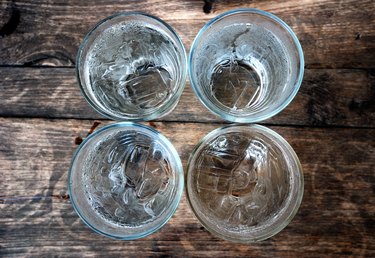
Water is one of the easiest ways to boost your health, since it's free and widely available, and it may help with weight loss as well. Staying properly hydrated helps your cells and tissues work properly, so you can maintain an active lifestyle.
Activity helps with weight control, and drinking water might help control your hunger under some circumstances. While it seems intuitive that cold water might be better for weight loss than room-temperature water, its temperature doesn't make a significant difference.
Video of the Day
Video of the Day
Tip
While water is a calorie-free to help you feel fuller while losing weight, the temperature of the water doesn't matter.
Water and Weight Loss
Weight loss is all about calories in and calories out, and burning more calories than you eat causes your body to burn fat for energy. Water is calorie-free, which makes it the best way to hydrate without taking in the calories and sugar found in other beverages — even healthy ones like juice. For example, switching your morning orange juice, at 112 calories per glass, according to the USDA, for a glass of water every day for a year would save you more than 40,000 calories annually, which is equivalent to almost 12 pounds of fat.
Drinking water also staves off dehydration, which can cause headaches or muscle cramps that would disrupt your active lifestyle. And since regular physical activity helps boost your daily calorie burn, missing out on exercise because of dehydration-related fatigue can make it harder for you to lose weight.
Read more: The Ultimate Guide to Fat Loss
Drink Cold Water
It seems intuitive that cold water might be better for weight loss than room-temperature or hot water — after all, your body will expend energy heating the water up to body temperature, which would up your calorie burn throughout the day.
But it turns out that heating ice water doesn't burn a significant amount of calories, according to the University of Washington. Your body warming a cup of water only burns around eight calories, so even if you're drinking lots of ice water throughout the day — say eight cups — you'd burn only about 64 extra calories. While those extra burned calories could offer a small advantage — you could get the same results from 5 to 15 minutes of moderate exercise a day.
Try Room-Temperature Water
Because cold water doesn't offer many calorie-boosting benefits, there's no significant downside to drinking room-temperature water. And if you're on-the-go all day, it might be more convenient — you can fill a large water bottle to sip throughout the day, rather than feeling tied to a fridge that stores your cold water. If that convenience benefit means you're able to stay hydrated more easily, that's better for overall weight loss than drinking less water because you're worried about making sure all your water is cold.
Read more: 10 of the Most Common Weight-Loss Mistakes
Drinking Enough Water
No matter how you drink your water, make sure you're storing it in a safe container. Some plastic water bottles contain chemicals — like bisphenol A, or BPA — which have been linked to a higher risk of obesity, according to a June 2017 article published by the Lancet. Look for BPA-free bottles, or opt for a glass or stainless steel water bottle to avoid the chemicals in plastic.
Get the weight loss benefits of hydration by making sure you drink enough water each day. The amount you need can vary based on your weight and activity level. A good rule of thumb — divide your weight, in pounds, by two, to calculate your baseline water intake, recommends the University of Missouri. Using this rule, a 180-pound person would need 90 ounces of water, and a 150-pound person would need 75 ounces. If you exercise, drink an extra 12 ounces of water for each 30-minute period of activity.
Avoid boredom by using natural flavorings in your water. Try adding chunks of refreshing watermelon, a few sliced strawberries, or even a cinnamon stick for a spicier option.
- University of Washington: "Mythbusters: Will Drinking Water Help With…?"
- University of Missouri: "How to Calculate How Much Water You Should Drink"
- USDA FoodData Central: "Orange Juice, Raw"
- The Lancet: "Bisphenol A Substitutes and Obesity in US Adults: Analysis of a Population-Based, Cross-Sectional Study"